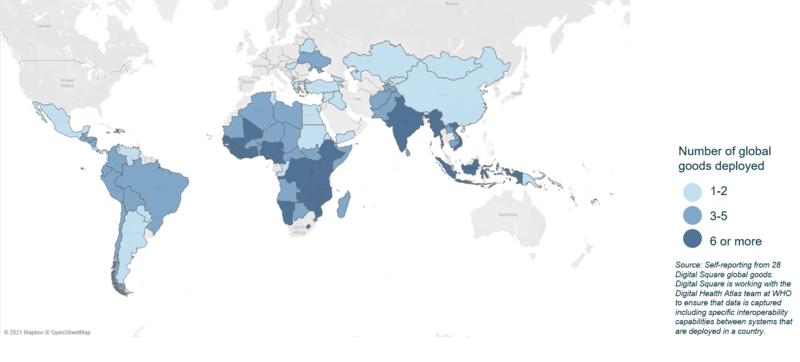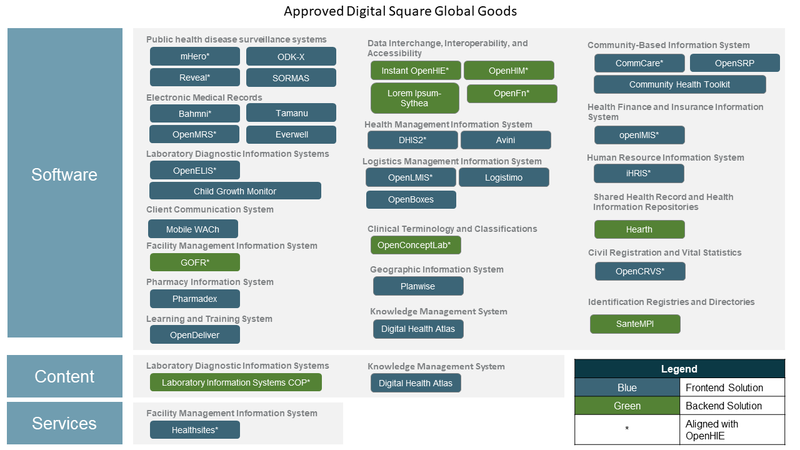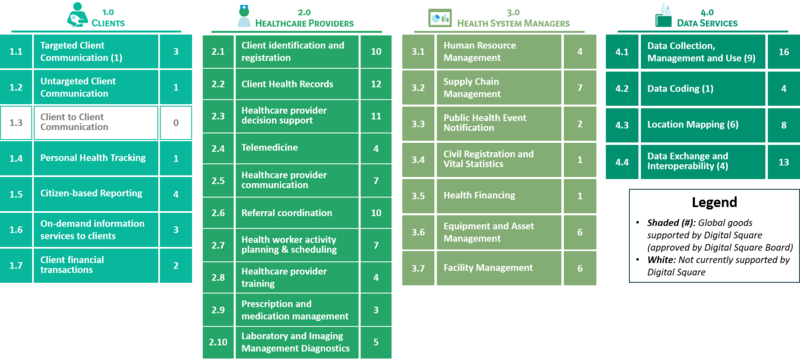Main Page
Digital Square is a digital health marketplace (or 'square') where supply and demand come together to accelerate health equity. We connect health leaders with the resources necessary for digital transformation. Digital Square is housed at PATH, and supported by USAID, the Bill & Melinda Gates Foundation, and a consortium of other donors.
This wiki serves as a platform for technical audiences to obtain resources and information related to Digital Square's investments in global goods. More general information about Digital Square can be found on the main website.
COVID-19 Response
Digital Square is leveraging its unique role and strengths to support countries, donors, and partners in the response to the COVID-19 pandemic. Harnessing existing relationships across the global digital health ecosystem, we mobilize our robust network of partners in coordinated response. We also utilize PATH's work in global health security, malaria, primary health care, and the broader digital and data portfolio to more comprehensively support country partners in ensuring essential health services remain available.
Read our full capability statement here. COVID-19
COVID-19 Community Coordination
Digital Square is pleased to share resources sourced from the Digital Health Community to facilitate alignment and coordination in the COVID-19 response, and to support countries choosing digital tools to aid in their own response efforts. If you have a resource you would like us to host on the wiki, please contact Amanda BenDor.
UNICEF Country Mapping for COVID-19 Response
UNICEF has initiated a country mapping of relevant Digital Health solutions that can be leveraged to support frontline health workers in their response to COVID-19 and that can be used by countries to support Risk Communication and Community Engagement on COVID-19. The mapping can be accessed here. If you want to update the country mapping, please use the comment function and the UNICEF team will update the information accordingly.
Likewise, a partnership landscaping has also been done to map where implementing partners are working to support digital tools for frontline health workers and which digital solutions they are supporting. This mapping can be accessed here. If your organization is missing from the partnership landscaping, you can add the information directly in the spread sheet.
Both these mapping tools are free to use by anyone who wish to know which solutions already exist at country level and that can be deployed for frontline health workers for COVID-19 response and recovery efforts.
Comparison of Digital Tools used in the COVID-19 Response
Countries have access to a large, complex ecosystem of digital platforms that can support COVID-19 response. The process of selecting the most appropriate platform for a country's specific needs or context can be overwhelming without clear information about the benefits and limitations of the options. Several new resources have been developed to support in-country assessment and decisions about digital technologies for COVID response.
Johns Hopkins assessment
In July 2020, Johns Hopkins published an assessment of digital platforms that have an established presence in several low- and middle-income countries (LMIC), and either have been or could be rapidly reconfigured to address COVID-19 related case management and contact tracing needs. The assessment includes a review of the following tools: CommCare, Community Health Toolkit (CHT), DHIS2 Tracker, Go.Data, ODK, OpenSRP, RapidPro, SORMAS, and WelTel. The platforms were selected based on their existing deployment, flexibility, and adaptability for COVID-19 use cases, their ability to support multiple languages, and stakeholder interest in how these applications can be leveraged in response to COVID-19. The full report can be accessed here.
Digital Square efforts
In recognition that this is a rapidly evolving landscape, Digital Square has been working across donors to collate a comparison of digital tools that are currently used in the COVID-19 response. Included in the comparison is an analysis of a number of functional and non-functional requirements. Including in this document are the following digital health tools: DHIS2, SORMAS, Go.Data, EpiInfo, CommCare, ODK, Kobo Toolbox, Excel and non-digital paper tools. This comparison is a dynamic document meant for community updates that can be accessed here. If you would like to make updates including adding additional tools or information to tools included, please contact Carl Fourie.
Additional COVID Resources
COVID-19 Webinars
October 28, 2020 | Global Good COVID-19 Adaptations Part III (OpenLMIS and OpenELIS)
This webinar focuses on how both OpenLMIS and OpenELIS have adapted their technologies to respond to the COVID-19 pandemic.
October 7, 2020 | Global Good COVID-19 Adaptations Part II (DHIS2 and mHero)
This webinar focuses on how both DHIS2 and mHero have adapted their technologies to respond to the COVID-19 pandemic.
June 16, 2020 | Can Image-based AI Meaningfully Impact COVID-19 Response in Low Resource Settings
This webinar explores the opportunities and challenges for the use of imaged-based AI tools in the COVID-19 response. Panelists discuss the broader context for the application of these tools; explore how they are being developed and evaluated; and identify what steps need to be taken to maximize the potential of image-based AI while mitigating the risks.
June 15, 2020 | Understanding the Unique Challenges & Opportunities of Combating COVID-19 in LMICs
April 30, 2020 | Private Sector Digital Adaptations for COVID-19 Response
In this webinar, leaders from the Digital Impact Alliance, Facebook, mClinica, Microsoft, and Tableau shared how to leverage private sector tools and technologies to strengthen health systems in COVID-19 response efforts.
April 7, 2020 | Managing the Global COVID-19 Pandemic with Health Informatics
In partnership with AMIA, this webinar shares informatics responses and challenges within the COVID-19 pandeimc.
March 30, 2020 | Global Goods Adaptation for COVID-19 Response Part I
This webinar features a set of Digital Square-approved digital health global goods that have adapted their technologies to respond to the COVID-19 pandemic.
March 26, 2020 | Re-utilizing PEPFAR Investments during the COVID-19 Response This webinar showcases how PEPFAR investments can be re-utilized in the COVID-19 response. During this session, we will feature a mix of digital tools including DATIM, Patient Level Monitoring, and the Global Open Facility Registry, and how they can be harnessed in the COVID-19 global response.
Digital Square Web Articles
- Global Goods Addressing Outbreaks: SORMAS and COVID-19
- LEGO lessons for COVID-19: Making data click
- Will COVID-19 accelerate digital transformation? 5 ways the development community can "build back better"
- Using DHIS2 for COVID-19 point of entry screening and travel pass printing in Uganda
Digital Square Information
What We Do
Digital Square addresses the need for a thriving marketplace for health.
We work in three key ways:
- Identify promising investment opportunities and provides operational support to streamline procurement
- Promote the development, adoption, and reuse of digital health global goods, and helps increase their availability, adaptability, and maturity
- Elevate country priorities and strengthen regional and national digital health capacity
Governance
Digital Square's investments follow detailed governance processes that leverage a Peer Review Committee, Board, and Investment Review Committee. Additionally, Digital Square serves as the Secretariat for DIAL's Health-Sustainability Advisory Group.
Investors
Digital Square is funded in partnership with USAID, the Bill & Melinda Gates Foundation, and a consortium of other donors. A full list can be found on the Digital Square website.
Global Goods
Global Goods are digital health tools that are adaptable to different countries and contexts. There are three types of global goods:
- Software: A software tool that is free and open source (FOSS), and used to manage, analyze, or transmit health-related data, with proven utility in several settings.
- Services: A software tool that is used to manage, transmit, or analyze health-related data that can be freely accessed as a software service and adheres to open data principles.
- Content A resource, toolkit, or data standard that is available under an open license and that is used to improve or analyze health data management processes.
A mature digital health software global good is software that is (frequently) Free and Open Source Software (FOSS), is supported by a strong community, has a clear governance structure, is funded by multiple sources, has been deployed at significant scale, is used across multiple countries, has demonstrated effectiveness, is designed to be interoperable, and is an emergent standard application.
About Digital Square Global Goods
Approved global goods include those which have submitted applications in response to a Notice. These include applications for specific work packages in response to a Notice. The applications are reviewed by the Digital Square Peer Review Committee and Investment Review Committee. The Digital Square Board approves the applications, or partial application work packages. An "Approved Digital Square Global Good" is not a formally vetted global good. Approved Digital Square global goods cover nearly all of the World Health Organization Digital Health Intervention Classifications. Many global goods are adaptable to support multiple interventions.
Read more:
Presence of global goods in countries
Digital Square Investments in Global Goods
Approved Digital Square global goods
Investment Processes
The Global Goods Community
Global Good Resources
- Global Goods Guidebook
- Demographics of Digital Health Tools
- GDHF 2020 Presentation on Aligning Global Public Goods: How WHO, UNICEF and Digital Square are coordinating for the digital health community (slides)
External Resources
- Principles for Digital Development
- The Mobile Economy 2018
- The Mobile Economy Sub-Saharan Africa 2017
- Scaling Digital Health in Emerging Markets
- The latest case study on a mHealth service in Tanzania: Healthy Pregnancy, Healthy Baby
Digital Square Resources
Digital Health & Interoperability Working Group
The Digital Health & Interoperability Working Group (DH&I WG) is a volunteer community of practice dedicated to strengthening country health systems and outcomes through the appropriate and responsible use of digital information technologies.
Contact Us
- Slack: Please join our slack team
About
Digital Square is a PATH-led initiative funded and designed by the United States Agency of International Development, the Bill & Melinda Gates Foundation, and a consortium of other donors.
The Digital Square wiki is made possible by the generous support of the American people through the United States Agency for International Development. The contents are the responsibility of PATH and do not necessarily reflect the views of USAID or the United States Government.



